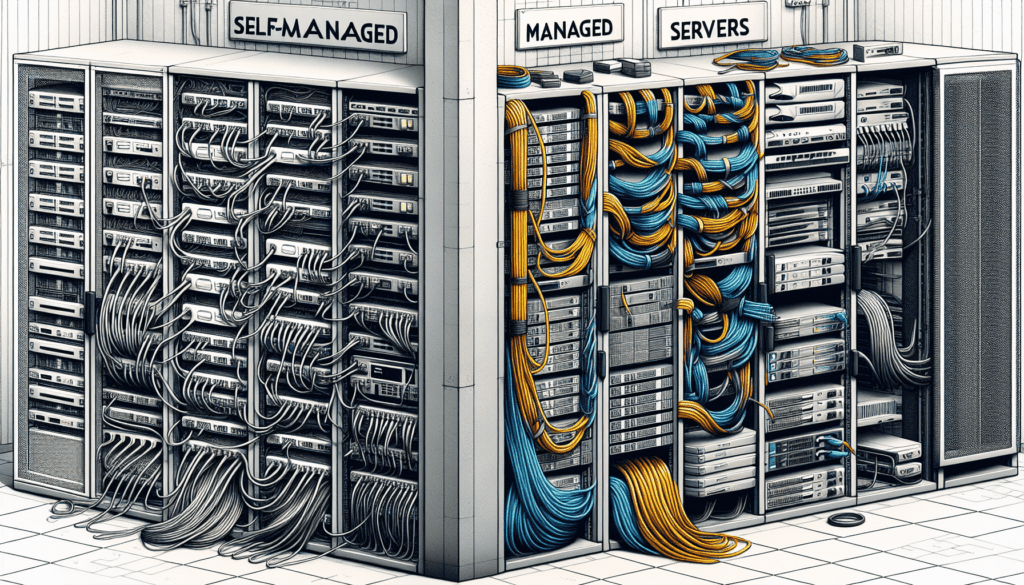Welcome to an informative article discussing the differences between self-managed and managed server hosting. When it comes to choosing the right hosting option for your website or application, it’s essential to weigh the advantages and disadvantages of each. Self-managed server hosting gives you more control and flexibility, but requires a higher level of technical knowledge and time commitment. On the other hand, managed server hosting offers convenience and expert support, but may come with limitations and higher costs. Let’s delve into the key factors to consider when making this important decision.
The Pros And Cons Of Self-managed Vs. Managed Server Hosting
Have you been considering setting up a website or moving your current one to a new server? If so, you’ve probably come across the decision of whether to go with self-managed or managed server hosting. Both options have their benefits and drawbacks, so it’s essential to consider your needs and technical expertise before making a choice. In this article, we’ll explore the pros and cons of self-managed vs. managed server hosting to help you make an informed decision.
Self-Managed Server Hosting
Pros
When opting for self-managed server hosting, you are in complete control of your server environment. This means you have the freedom to configure, optimize, and customize your server to meet your specific needs. Here are some of the advantages of self-managed server hosting:
-
Cost-Effective: Self-managed server hosting is generally more cost-effective than managed hosting since you are responsible for managing the server yourself. This can be a great option for small businesses or individuals looking to save money.
-
Customization: With self-managed hosting, you have the flexibility to install any software, applications, or tools you need on your server. This level of customization allows you to tailor your server environment to suit your unique requirements.
-
Learning Experience: Managing your server can be a valuable learning experience, especially if you are looking to enhance your technical skills. You will gain a deeper understanding of server administration, networking, security, and other key areas.
Cons
While self-managed server hosting offers more control and flexibility, it also comes with its own set of challenges. Here are some of the drawbacks to consider:
-
Technical Expertise Required: Setting up and maintaining a self-managed server requires a certain level of technical expertise. If you are not comfortable with server administration, troubleshooting, and security practices, you may find it challenging to manage your server effectively.
-
Time-Consuming: Managing a server can be time-consuming, especially if you are new to server administration. You will need to invest time in monitoring system performance, applying updates, resolving issues, and ensuring the security of your server.
-
Security Risks: Without professional support and guidance, self-managed servers may be more vulnerable to security threats and attacks. It’s essential to stay vigilant and implement robust security measures to protect your server from potential risks.

Managed Server Hosting
Pros
Managed server hosting, on the other hand, offers a more hands-off approach to server management. A team of experts will handle the day-to-day operations of your server, allowing you to focus on your business. Here are some of the benefits of managed server hosting:
-
Professional Support: With managed hosting, you can rely on experienced professionals to monitor, maintain, and secure your server. This can give you peace of mind knowing that your server is in good hands and help you avoid technical challenges.
-
Time-Saving: By outsourcing server management to a dedicated team, you can save time and focus on other aspects of your business. This can be particularly beneficial for busy entrepreneurs or businesses with limited IT resources.
-
Enhanced Security: Managed hosting providers often offer robust security measures, such as firewalls, malware detection, and regular backups, to protect your server from security threats. This can help prevent potential breaches and data loss.
Cons
While managed server hosting offers convenience and peace of mind, it may not be suitable for everyone. Here are some of the drawbacks to consider:
-
Cost: Managed hosting tends to be more expensive than self-managed hosting, as you are paying for professional support and services. This can be a significant consideration for budget-conscious individuals or businesses.
-
Limited Customization: With managed hosting, you may have limited control over the server environment, as the provider will handle most configurations and optimizations. This can be restrictive if you require specific software or tools on your server.
-
Dependency on Provider: By relying on a managed hosting provider, you are at the mercy of their policies, procedures, and support. If the provider experiences downtime or issues, you may experience disruptions to your server and business operations.

Conclusion
In the end, the choice between self-managed and managed server hosting comes down to your technical skills, resources, and business priorities. Self-managed hosting offers control, customization, and cost savings but requires technical expertise and time commitment. Managed hosting provides professional support, security, and convenience but comes at a higher cost and limited customization.
Before making a decision, carefully assess your needs, budget, and comfort level with server management. Consider reaching out to hosting providers for guidance and exploring customer reviews to find a reputable and reliable provider. By weighing the pros and cons of self-managed vs. managed server hosting, you can make an informed choice that aligns with your goals and ensures the success of your website.







